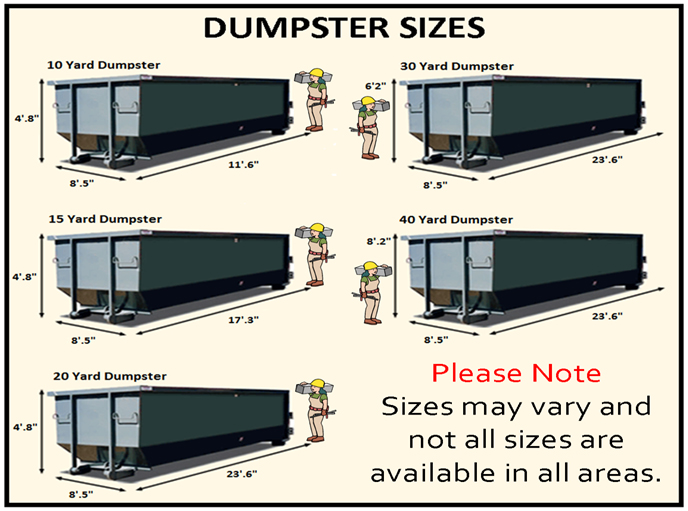Dumpster rental is an essential facet of numerous projects, from home renovations to massive construction, needing an extensive understanding of the process to stay clear of costly errors and ensure effective project implementation. Choosing the right dumpster size, comprehending rental costs, and thinking about logistics and regulations are crucial action in the procedure. Furthermore, knowing what can and can not enter a dumpster, preparing the website for distribution, and getting necessary permits are essential parts of an effective dumpster rental experience. By grasping these basic concepts, you'll be well on your way to a trouble-free job, and a much deeper exploration into the details will certainly expose even more beneficial insights.
Choosing the Right Dumpster Size
Typically, property owners and professionals alike undervalue the relevance of choosing the right dumpster size for their project, which can bring about costly consequences
This oversight can result in a dumpster that is either also small, causing several trips to the landfill, or as well huge, wasting valuable space and resources.
To stay clear of these issues, it's crucial to properly estimate the volume of waste your task will certainly generate.
Consider the type of products you'll be dealing with, the dimension of the location being remodelled, and the period of the project.
A basic guideline is to overstate by 10-20% to account for unexpected waste
Understanding Dumpster Rental Costs
Several aspects contribute to the overall cost of dumpster rental, making it essential to recognize the pricing structure to spending plan precisely for your project.
The size of the dumpster is a considerable element, as bigger dumpsters call for even more materials and labor to manufacture and transfer. The sort of particles you plan to take care of additionally influences the cost, as hazardous materials or hefty construction waste may require special delivery and disposal procedures.
Additionally, the rental duration, area, and regional guidelines can impact the last expense. Some dumpster rental business may bill added for services like same-day delivery, weekend delivery, or added pickups.
Others may offer discount rates for long-lasting services or bundled services. To obtain an accurate estimate, it's vital to give detailed info about your task and requirements.
Be sure to inquire about any additional fees or fees when requesting a quote to avoid shocks on your final bill.
Dumpster Rental Period and Logistics
When intending a dumpster rental, it's similarly crucial to consider the logistics of the rental period, as this can substantially influence the total success of your job. This consists of determining the ideal rental period, which normally ranges from a couple of days to several weeks or perhaps months, depending on the range of your project.
It's vital to choose a rental duration that lines up with your project timeline to guarantee you have enough time to finish the work without incurring additional fees
Additionally, take into consideration the logistics of dumpster delivery and pickup Will the dumpster be provided to a certain area, such as a driveway or building site? Exist any type of access restrictions or unique demands for the shipment and pickup process?

Understanding these information will aid you intend as necessary and prevent any type of potential issues or delays.
Lastly, be sure to inquire about the rental firm's policies regarding dumpster relocation, if required, and any kind of extra charges related to expanding the rental period.
Permits and Regulations to Consider
The regional metropolitan landscape is populated http://piedmont-triaddumpsters.yousher.com/from-building-sites-to-home-cleanouts-versatile-uses-of-dumpsters with policies and laws regulating waste management, and your dumpster rental task is no exception. Prior to you start, it's crucial to recognize the permits and regulations that put on your particular job. Failure to abide can lead to fines, project delays, or even termination.
Some towns need licenses for dumpster placement on public or personal property. These licenses typically feature particular standards for dumpster size, placement, and duration. In addition, certain types of waste, such as hazardous materials or construction particles, might go through special regulations.
It's important to research and comprehend the local regulations and permits needed for your task. Your dumpster rental carrier might have the ability to provide assistance or help in getting the essential permits.
Be sure to factor in the moment and cost of licenses right into your job timeline and budget plan. By doing so, you can guarantee a smooth and compliant dumpster rental experience.
What Can Enter a Dumpster
Understanding what can be disposed of in a dumpster is important to an effective waste administration project Understanding what can and can not go in a dumpster aids stop contamination, decreases the danger of penalties, and assures a smooth job execution.
Most dumpsters can fit a vast array of products, consisting of construction debris, family trash, backyard waste, and demolition materials. Nonetheless, there are specific things that are prohibited from being gotten rid of in dumpsters, such as hazardous waste, electronics, batteries, and fluorescent light bulbs.
Additionally, some products might require special handling, like appliances, tires, and cushions, which might incur added fees.
It's crucial to talk to your dumpster rental supplier for certain standards on what can be gotten rid of in their dumpsters. They can provide you with a comprehensive list of acceptable and forbade items, seeing to it that you remain in conformity with local regulations and guidelines.
Preparing for Dumpster Delivery
Site preparation is essential for a seamless dumpster shipment experience. Before the dumpster arrives, ensure the delivery area is clear of any obstacles, consisting of cars, trees, and power lines.
A flat, degree surface is essential for secure and efficient placement. Furthermore, make certain the course to the delivery site is at least 10 feet vast to accommodate the dumpster truck.
Measure the space where the dumpster will be put to verify it fits conveniently. Think about the dumpster's dimensions, including its size, size, and elevation, along with the swing radius of the vehicle's arm.
If you're not sure, speak with your dumpster rental provider for guidance.